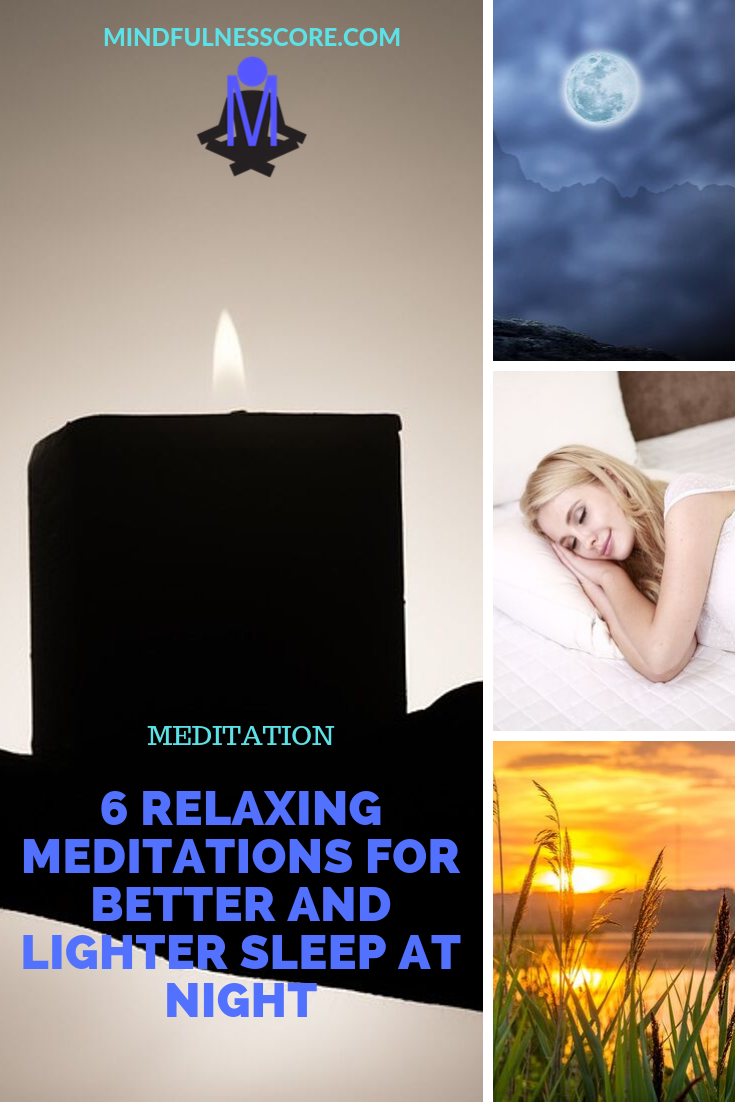6 Relaxing Meditations for Better and Lighter Sleep at Night

If you have landed on this page and are searching for more information about meditations, then congratulations, you have decided to take good care of your mental health. With precision and consistency, meditation has various benefits to offer which include and are not confined to peaceful sleep, keeping a check on stress and anxiety, promoting emotional health, increasing self-awareness, and improving your attention span. Meditation is a natural remedy if you are looking for mood enhancement that is effective, yet time-efficient. For some people, it has also been proven to help with the battle against addictions or memory loss that is generally associated with aging.
Loosening your body and activating the natural relaxation response may not be as convenient for some people as it sounds after a long day of a hectic schedule. Consider the most destructive habit of humankind of taking their smartphones, laptops, or other technological gadgets with them to the bed, and the situation certainly gets grimmer. Under such circumstances, it is understandable for you to find it hard to fall asleep.
For a peaceful, deep sleep, the only requirement is a reduction in mental activity. Have you ever experienced the days when you think you are physically tired and exhausted and you’re thinking it is going to be one of those days when you tuck yourself in and will fall asleep immediately? But then you lie down on your bed for hours, looking at the ceiling or out the window failing to understand why you are still up. There’s nothing more frustrating than this scenario when your body has tapped out but your mind refuses to go to sleep. The reasons could be plenty. Perhaps you are dwindling in the past, or probably you are overthinking about the future. Whatever the reason may be, the good news is that meditation can pull you out of the intricate web of your own thoughts and help you sleep faster and better.
With thorough research, we have devised a list of 6 mindfulness exercises that you can practice in the night for ensuring better and lighter sleep.
Take A Deep Breath
Deep breathing is the very core of meditation and mindfulness exercises. Being simple yet effective, it is used by mental health professionals, physiotherapists, sports coaches, yoga instructors, etc. If you are finding it hard to sleep at night, the answer for you may as well lie in deep breathing.
In order to get the most out of this exercise, it is recommended to disconnect yourself from all of your smart devices and gadgets. Put your laptop to sleep, turn your mobile phone off, put all of the blue-lit devices away. It will cause a natural reduction in mental activity, taking you a step closer to quality sleep. Once done, lie down straight on your bed and get under the covers. You can either throw your hands comfortably by the side of your head, or you can put them on your stomach with palms facing down. Now start taking deep, slow breaths through your nostrils and exhale slowly through your mouth. If you find your thoughts wandering, keep your cool and gently try to push them out and get your focus back to breathing. Practice this exercise for at least 5 minutes to activate the natural relaxation response and achieve the calm and peaceful state of mind required for better and lighter sleep.
Count Backwards
Next in our list of mindfulness exercises that you can practice in the night for a night of better and faster sleep is backward counting. Start with 100 and count backward all the way down to 0. Don’t rush while counting, and certainly don’t take it as a challenge or a competition. Take your time and count slowly. If you forget where you were, don’t fight or ponder over it to remember. Simply let it go and start with 100 again. If you get to 0 without forgetting and are not feeling sleepy yet, start with 100 again. The whole point here is to let it all come naturally and not a part of careful thinking. Remember, it’s not a test. It is not categorized as right or wrong. It is all simply a part of meditation for the purpose of removing unnecessary thoughts from your mind, reducing mental activity, activating the natural relaxation response, and letting you fall asleep quickly. With practice, this exercise can turn into a surefire way of promoting quality sleep in the night.
Focus On Your Personal Mantra
As mentioned earlier, the reason why you are finding it hard to fall asleep in the night is because of excessive mental activity. There must be several thoughts in your mind that you can’t get rid of. Therefore, having a personal mantra can work like a charm for promoting relaxation. Your personal mantra can be any phrase that is positive in nature and brings peace to you. For instance, the statement [restrict] “I am thankful for….“, can make an incredible mantra that you can focus on in the night before sleeping. Just think of a single thing that you are extremely thankful for in your life. In the night when you get under the covers, lie down in a comfortable position and repeat your personal mantra in your mind. Focus on the single positive phrase. It’ll help to remove all of the other troubling thoughts out of your mind and to make it peaceful for you to fall asleep.
Visualize What You Love
The visualization technique works in a similar way as the personal mantra. But instead of focusing on a phrase, you are now focusing on a face or a thing that you love. For most people, focusing on the face of their partner or their parents works optimally. However, there are no restrictions on what you want to visualize. It just has to be something or someone that you deeply love. Even if it is just a cookie that makes you happy, visualizing it in your mind can help make you peaceful as well. The procedure is identical as well. Lie down on your bed in a comfortable position, get under the covers, close your eyes, visualize what you love and focus on it. Getting your mind busy with visualizing something that you feel affection for, will take it off the other thoughts which have been keeping you up in the night. It will cause a reduction in stress and anxiety and will promote relaxation for better and lighter sleep.
Breathe Through Alternate Nostrils
Last but not the least in our list of mindfulness exercises to promote better and lighter sleep in the night is breathing through alternate nostrils. It is a very simple activity to practice and doesn’t take more than 5 minutes of your time. As with the other mindfulness exercises, once you are in bed in search of sleep, use your right index finger to close your right nostril and take a deep breath through your left nostril. You can combine this technique with square breathing by slowly taking a deep breath for 4 seconds, holding the air in your body for 2 seconds, and then exhaling slowly for four seconds through the same nostril. Once done, repeat the same process with the other nostril. Repeat the exercise for about 3 minutes. With the excessive supply of oxygen, your mind will function optimally, enhance mood, reduce stress and anxiety, and optimize the mental activity for falling asleep.
Other than the mindfulness exercises mentioned above, you can also try focusing on a peaceful and soothing sound for better and lighter sleep in night. For instance, once you are in bed, you can close your eyes and focus your attention on the sound of a fan, or perhaps the rain falling outside. You can also find certain bed-time guided meditation tracks if you search on the internet. They are also effective owing to the soothing voice of the instructor. Focusing on it can also induce faster and better sleep by making your mind calm and peaceful and removing the haunting thoughts out of it.
Conclusion
In the light of the information mentioned above, it won’t be wrong to conclude that meditation is a simple and effective strategy to calm your mind in the night for a better, faster, and deeper sleep. All of the techniques that we have mentioned are well tried and tested and are known to be effective if done properly and consistently. You can either try all of them or a combination of some and see which combination works the best for you. What’s great is that they are all time-efficient and even practicing all of them won’t take more than a few minutes for you every night. It is your right to have a calm and peaceful sleep in the night, and we have provided a solution that is destined to deliver just that. Letting you have the required information was our responsibility, following the instructions and meditating every night, is yours. So, what would you decide? [/restrict]

